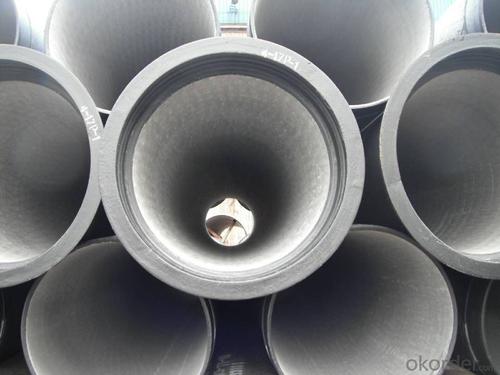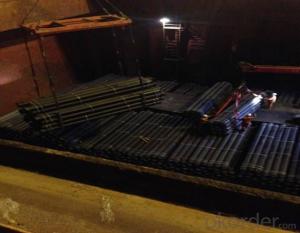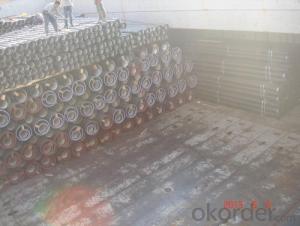DUCTILE IRON PIPE DN1200 K8/C
- Loading Port:
- China Main Port
- Payment Terms:
- TT OR LC
- Min Order Qty:
- -
- Supply Capability:
- -
OKorder Service Pledge
OKorder Financial Service
You Might Also Like
Specification:
1) The standard of pipe: ISO2531:1998, K9
2) Effective length: 6m
3) Inner cement line: Portland cement line as per ISO4179
4) Zinc coating: at least 130g/m2 as per ISO8179
5) Bitumen painting: at least 70um as per ISO8179
6) With 100% quantity of NBR ring, or SBR ring, or EPDM ring as per ISO4633
7) DN80mm-800mm
8) High strength, lighter than grey iron, good corrosion resistance, no furring, small flow resistance, easy fixing, long life tome about 100 yeas
9) Produced by Hangzhou chunfeng machine
10) Checked by automatic inspection equipment
11) Composition:
Chemical composition | |||
Chemical composition | Ductile Cast Iron Pipe (%) | Grey iron pipe (%) | Steel pipe (%) |
C | 3.5-4.0 | 3.2-3.8 | 0.1-0.2 |
Si | 1.9-2.6 | 1.4-2.2 | 0.15-0.4 |
Mn | 0.15-0.45 | 0.4-0.6 | 0.3-0.6 |
P | ≤0.06 | ≤0.3 | 0.02-0.03 |
S | ≤0.02 | ≤0.1 | 0.02-0.03 |
Mg | 0.03-0.06 |
|
|
12) Feature:
Mechanical properties | |||
| Ductile Cast Iron Pipe | Grey Iron Pipe | Steel Pipe |
Tensile Strength(Mpa) | ≥420 | 150-260 | ≥400 |
Yield Strength(Mpa) | ≥300 | No Confirmation | No Confirmation |
Bending Strength(Mpa) | ≥590 | 200-360 | ≥400 |
Elongation (%) | ≥10 | Neglected | ≥18 |
Brinell Hardness(HBS) | ≤230 | ≤230 | About 140 |
13) T type mechanical joint
14) Packing: in bulk or container
- Q: Are ductile iron pipes suitable for bridge crossings or crossings under roadways?
- Bridge crossings or crossings under roadways can be easily accommodated with ductile iron pipes. These pipes possess remarkable strength, durability, and resistance against external forces like heavy traffic loads and bridge movements. With their high tensile strength, they can endure the stress and strain caused by vehicles passing over them. Furthermore, ductile iron pipes exhibit exceptional corrosion resistance, rendering them suitable for underground installations that may come into contact with water or other corrosive elements. Additionally, their long lifespan and minimal maintenance requirements make them a dependable choice for bridge crossings or crossings under roadways. Consequently, ductile iron pipes offer a cost-effective and efficient solution for such infrastructure projects.
- Q: Can ductile iron pipe be used for water treatment plants?
- Yes, ductile iron pipe can be used for water treatment plants. Ductile iron pipe is a commonly used material in the water industry due to its strength, durability, and corrosion resistance. It is suitable for various applications, including transporting water in water treatment plants. Ductile iron pipe can withstand high pressure and is well-suited for underground installations. It also has excellent resistance to corrosion from water and chemicals commonly used in water treatment processes. Additionally, ductile iron pipe is easy to install and maintain, making it a preferred choice for water treatment plants. Overall, ductile iron pipe is a reliable and cost-effective option for water transport in water treatment plants.
- Q: How does ductile iron pipe perform in areas with high groundwater levels?
- Ductile iron pipe performs exceptionally well in areas with high groundwater levels. One of the key advantages of ductile iron pipe is its corrosion resistance, which makes it highly suitable for underground applications and areas with high water tables. Unlike other materials, ductile iron pipe is not susceptible to rust or corrosion caused by groundwater, ensuring its durability and longevity. Furthermore, ductile iron pipe has excellent strength and flexibility, allowing it to withstand the external pressure exerted by high groundwater levels. It can resist the buoyant forces exerted by water, preventing it from floating or shifting out of place. In addition, ductile iron pipe's joints are tightly sealed, preventing any groundwater from infiltrating the pipe system. This ensures that there is no leakage or contamination of the water supply, which is crucial in areas with high groundwater levels. Overall, ductile iron pipe is the ideal choice for areas with high groundwater levels due to its corrosion resistance, strength, and ability to maintain a tight, secure system. It provides a reliable and long-lasting solution for water distribution and sewer systems, even in challenging environments.
- Q: Does the cast iron have size 250? What's the performance?
- You should be the casting grade or material, if it is ductile iron, said generally between QT400-15 or QT700-2 different indicators, said in front of the tensile strength, the elongation rate refers to the back, China is now the lowest grade of nodular cast iron material is QT400-15, such as QT250.In addition, the number 250 you refer to may also be a code name for ductile iron parts, such as 200, 300, etc., which are manufactured by the factory as required by the project.Gray iron, which has a 250 brand, is generally referred to as HT250, but it is not ductile iron.The machine on the ductile iron and gray iron are used, but generally not made of grey cast iron gear
- Q: Can ductile iron pipes be used in areas with high soil erosion?
- Ductile iron pipes, due to their inherent strength and durability, can be used in areas with high soil erosion. Ductile iron is a type of iron that has been treated with graphite nodules, which enhances its flexibility and tensile strength. This makes it highly resistant to cracking and breaking, even under extreme conditions. In areas with high soil erosion, the ground is prone to shifting and movement, which can put significant stress on underground pipes. However, ductile iron pipes have a high resistance to external loading and can withstand the pressures exerted by the surrounding soil. They have been extensively tested and proven to be reliable in such environments. Furthermore, ductile iron pipes have a long lifespan, often exceeding 100 years, which makes them a cost-effective choice for areas with high soil erosion. Their corrosion resistance and structural integrity make them suitable for installation in various soil conditions, including those prone to erosion. It is important to note that proper installation techniques, such as using suitable bedding and backfill materials, should be followed to ensure the optimal performance of ductile iron pipes in areas with high soil erosion. Additionally, regular inspection and maintenance should be conducted to identify any potential issues early on and prevent any damage caused by soil erosion. Overall, ductile iron pipes are a reliable and durable option for areas with high soil erosion, providing long-lasting and efficient water distribution and wastewater management systems.
- Q: What are the interface forms of ductile iron pipes? The best drawings are available. Thank you
- There are many kinds of ductile iron pipe interfaces, and the T type interface (sliding type) flexible interface is famous for its fast installation and simple installation.
- Q: Can ductile iron pipe be recycled?
- Yes, ductile iron pipe can be recycled. It is a highly recyclable material that can be melted down and reused in the production of new ductile iron products. Recycling ductile iron pipe helps reduce waste and conserves natural resources.
- Q: Are ductile iron pipes resistant to freeze-thaw cycles?
- Yes, ductile iron pipes are resistant to freeze-thaw cycles. Ductile iron is a type of cast iron that has been treated with magnesium, which improves its strength, durability, and resistance to cracking. This enhanced material properties make ductile iron pipes highly resistant to the expansion and contraction that occurs during freeze-thaw cycles. Unlike other materials such as PVC or concrete, which may crack or break under the pressure caused by freezing water, ductile iron pipes have the ability to withstand these cycles without sustaining any significant damage. Additionally, ductile iron pipes have a smooth interior surface that prevents the formation of ice or frost buildup, further enhancing their resistance to freeze-thaw cycles. Overall, ductile iron pipes are an excellent choice for water distribution systems in regions with cold climates, as they offer superior resistance to the effects of freezing and thawing.
- Q: Can ductile iron pipe be used for water distribution systems in cold climates?
- Yes, ductile iron pipe can be used for water distribution systems in cold climates. Ductile iron has excellent resistance to freezing and can withstand extreme cold temperatures without becoming brittle or cracking, making it a suitable choice for water distribution systems in cold climates.
- Q: Are ductile iron pipes suitable for use in brewery facilities?
- Yes, ductile iron pipes are suitable for use in brewery facilities. Ductile iron pipes are durable, corrosion-resistant, and can withstand high-pressure applications, making them ideal for transporting water, steam, and other fluids within brewery facilities. Additionally, the smooth interior surface of ductile iron pipes minimizes friction and prevents the build-up of sediments or organic materials, ensuring the purity and quality of the beer being produced.
Send your message to us
DUCTILE IRON PIPE DN1200 K8/C
- Loading Port:
- China Main Port
- Payment Terms:
- TT OR LC
- Min Order Qty:
- -
- Supply Capability:
- -
OKorder Service Pledge
OKorder Financial Service
Similar products
Hot products
Hot Searches
Related keywords



























